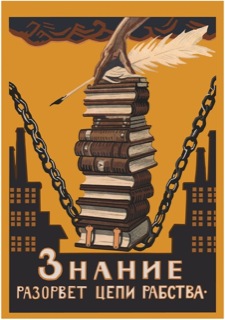Anyone who is politically active knows the importance of reading—and knows the weight of books one ought to have read. It is easy to become overwhelmed with the sheer volume of works to be read and the knowledge to acquire and process, and not only from weighty political tomes.
For a person not used to reading, or who has difficulty reading, it can be an intimidating exercise to embark upon and can lead to a fear or paralysis about reading at all. This fear or inability can cut them out of access to works intended to develop or expand one’s own knowledge in quite a direct way.
The Bolsheviks understood the importance of people having the means to free themselves from ignorance through literature. They knew that access to knowledge was power, and emancipatory in itself. This sentiment was captured in 1919 when V. I. Lenin signed the decree On the Eradication of Illiteracy among the Population of the RSFSR.¹ All Soviet citizens from eight years old were required to be literate in their native language, the cornerstone of what is now called emancipatory literacy.
In 1917 only an estimated 38 per cent of the male population above seven years old was literate, and only 12½ per cent of the female population. The gendered aspect of illiteracy was an essential component of the campaign, and the Zhenotdel (Women’s Department of the Bolshevik party) played a leading role in both the dissemination of pro-literacy pamphlets and the running of literacy classes and education and employment courses for women. The success of this work could be seen in the 1950s, when the Soviet Union was able to celebrate nearly 100 per cent literacy, for men and women.
Today, just over a quarter (26 per cent) of adults in the Irish state score at or below level 1 on the numeracy scale; this is slightly higher in the North of Ireland, at 27 per cent.
The OECD Adult Skills Survey (2013) shows that up to 6 per cent of Irish university graduates are functionally illiterate.² The general illiteracy rate stands at 18 per cent, or about 1 in 6. Illiteracy in this survey was defined as being below level 1 on a five-level literacy scale. At level 1 a person may be unable to understand basic written information. This figure stands at approximately 20 per cent in the North of Ireland.
Higher levels of literacy are essential for a country to thrive. Higher rates are associated with healthier populations, less crime, greater economic growth, and higher employment rates. For a person, literacy is a foundational skill required for developing critical thought, grasping the understanding of important concepts, and the ability to debate and present arguments. Literacy allows a person to seek out information, explore subjects in detail, and gain a deeper understanding of the world around them; its absence leaves a population easy to distract, control and appease with less.
While the gaps do seem to be closing, there is still a stark age, gender and class component of illiteracy. People over the age of fifty-five report higher levels of difficulty with literacy, while women in this cohort are more likely to report difficulty than men. The National Assessments of English Reading and Maths (2014) show the proportion of pupils in second class performing at level 1 or below in reading to be 22 per cent. The Programme for International Student Assessment (2015) showed that the proportion of fifteen-year-olds performing at or below level 1 was 10 per cent. These percentages were much more pronounced in DEIS³ schools and will have a lasting effect on already disadvantaged, marginalised and forgotten communities.
It’s worth making the comparison at this point with countries that have continued in the tradition of the Soviets. Cuban literacy for 2012 was 99¾ per cent. Before the revolution, Cuba’s rate of literacy was 77 per cent, but through a literacy campaign initiated in 1961 by Fidel Castro (at the behest of Che Guevara) this rate had already increased to 96 per cent by 1962. Cuba has been able to maintain this high rate of literacy despite the blockade because of a continuous valuing of the importance of education for both the country and the people’s individual benefit. They have made a concerted effort to promote it in all fields.
The literacy rate of India is 78 per cent, while Kerala has emerged as the most literate state in the country, at 96 per cent. Much credit has been given for this to the royal family of the region, and while this may be partially true it is also worth noting that it is Kerala’s communist legacy of governance that has built upon this, alongside the ensuring of a relatively higher and equitable access to education, nutrition and health services among its residents than in other regions of India.
Kerala and Cuba prove that there is no justifiable reason that any person should be left without literacy. It is never a personal failing to be left without the skill required to make it in this world but rather a systemic one that does not value the potential contribution of all. We all deserve better than that.
Ireland meanwhile continues to promote itself as “the best small country in the world in which to do business”; but when we have such stark gaps in our education that sizable numbers of people are being left behind, even at third level, it raises the question of who our education system serves, and who we want that to be. Is its role simply producing workers for capitalists—workers who know enough to perform their assigned role—or do we want all people to have access to information independently for their own uses and their own benefit?
■ For anyone seeking assistance, the National Adult Literacy Agency runs free personal and on-line courses for adults who wish to improve their literacy or numeracy. Information can be found at www.learnwithnala.ie. In Dublin, classes are held in the SIPTU offices in Liberty Hall.
- Russian Soviet Federative Socialist Republic.
- The 2021/22 iteration of the OECD survey of adult capabilities involving literacy and numeracy is still in progress, and results have not been published yet.
- “Delivering Equality of Opportunity in Schools.”






